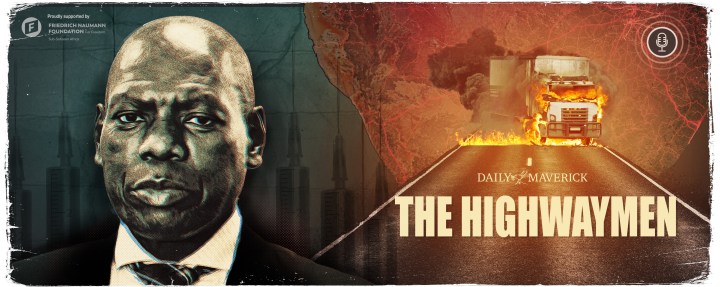THE HIGHWAYMEN PODCAST EDITORIAL
Episode 3: Politics of the Bullet

The third episode of Daily Maverick’s hit podcast ‘The Highwaymen’ reminds us that democratic South Africa’s second act is being forged with the gun. Why is the county so unwilling to acknowledge this fact?
‘Behind every man now alive stand 30 ghosts, for that is the ratio by which the dead outnumber the living.” So wrote Arthur C Clarke in 2001: A Space Odyssey. In South Africa, the ghosts are far more numerous than that, and as the alleged democratic era bumbles into its next phase, they are becoming louder and more insistent in their demands for the living’s attention.
Two things are baffling about the current conception of South Africa. The first is that the transition from race-based fascism to ANC-ism was “peaceful”. What, then, are we to make of the 20,000 people killed in KwaZulu-Natal from 1990 to 1994? And why was this proxy conflict between the apartheid regime and the ANC never termed a civil war?
The academic Mark Gersovitz and think-tanker Norma Kriger, writing for the World Bank Research Observer in 2013, defined civil war as “a politically organised, large-scale, sustained, physically violent conflict that occurs within a country principally among large/numerically important groups of its inhabitants or citizens over the monopoly of physical force within the country”.
LISTEN TO EPISODE 3
THE HIGHWAYMEN, Episode 3: A Rising Tide Lifts All Superyachts
Well, hello?
The second misconception — and this one is more serious and pressing — is that after 1994 the killing came to a stop. No question, it wound down in intensity, and the ghosts became less numerous. Just as importantly, the nature of the killing changed.
But one thing is for sure: South Africa’s political present has been shaped by political murders, and no one in a position of authority seems interested in facing this fact.
The locus of South African political murders is, of course, KwaZulu-Natal — call it a hangover of the violence that bloodied transition. According to the Global Initiative against Transnational Organized Crime (GI-TOC), “Of the 418 political hits recorded nationwide between 2000 and 2021, 213 took place in the last seven years, and of that number, 118 were in KZN.”
Widen the aperture a little, and we see that there were 1,971 assassinations in this country between 2000 and 2021. The causes intersect: political contestation, gangland slayings, taxi violence, and banal personal loathings. Attempting to separate organised crime from the taxi industry, the taxi industry from politics, and politics from organised crime, leads only to a great brick wall of frustration. The lines blur: are our politicians gangsters, or are our gangsters politicians?
Is there a difference any more?
We understand that at the nexus of these slayings are contestation for positions within the ANC — positions which lead to tenders and kickbacks, and can thus be the difference between a life of poverty and a life of relative plenty.
Which is another way of saying that South Africa has failed as an inclusive economy.
Now, the murders are spreading out of KZN, and anyone who happens to be so much as adjacent to a whistle-blower knows to watch their back. Last year, the slaying of Babita Deokaran, the chief director of financial accounting in the Gauteng Department of Health, was allegedly linked to a PPE spending scandal she was helping to expose. Fear is shaping the way South African bureaucrats behave, because the message is clear: fall in line, or die.
Despite all the bloodshed, government and law enforcement officials have not acted with the requisite urgency. The state-appointed Moerane Commission, which was intended to probe political killings in KZN, came and went in 2017 with little fanfare. (The ANC was battling itself in the lead-up to its end-of-year electoral conference, and so was otherwise occupied.)
Meanwhile, the eThekwini-based shack dwellers’ collective, Abahlali baseMjondolo, has had 24 of its members killed since its formation in 2005 — all because they stand in opposition to ANC government policy.
Perhaps it’s time we moderate the narrative, and start listening to the ghosts. They’re telling us that we live in an assassination nation. We should take their word for it. DM

















Comments - Please login in order to comment.